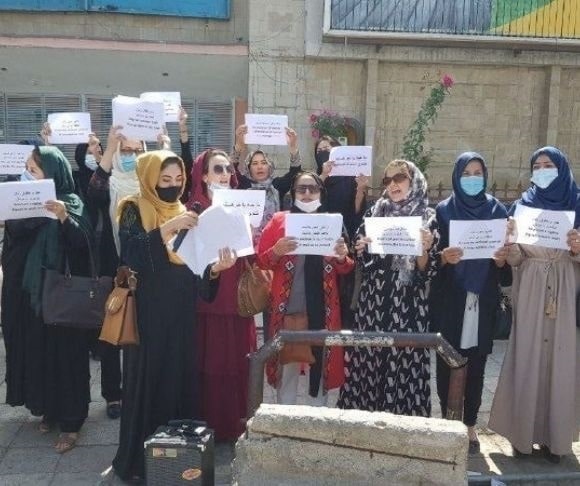The Biden administration would surely like to divert America’s attention from the national security team’s miserable performance in the last days of reducing the U.S. presence in Afghanistan. That will not be possible. The way a Time headline put it, “The War In Afghanistan Is Over. But Congressional Oversight Is Just Beginning.” The many planning and execution transgressions for which the administration must answer will be tied to a key question. In his insightful analysis, Jeff Charles, Liberty Nation’s socio-political correspondent, asked that question, “What Did Biden Know and When Did He Know It?” Up till now, the narrative has been that no one in the administration had any inkling the Taliban would move so quickly to capture all of Afghanistan.

(Photo by Haroon Sabawoon/Anadolu Agency via Getty Images)
As Congress and others begin their investigations of what went horribly wrong taking U.S. troops, civilians, and Afghan supporters at risk out of the collapsing country, there are some pitfalls that need to be avoided. Liberty Nation explained a few of the most apparent blunders but, clearly, a more thorough examination is warranted. However, as the frenzy to assign blame gets up to speed, understanding a phenomenon within the ranks of Washington, D.C. political wonks is important.
There are two ways to turn valid inquiries into U.S. leadership malfeasance into nothing burgers. First, an effort will be made to broaden the scope of the investigation to include every possible aspect and turn of events. Such an approach has the deceptive value of appearing thoughtful and comprehensive. The fact is this methodology creates an analysis space that is so big, citizens cannot reasonably get their heads around the conclusions. More importantly, the media generally cannot understand the nuances and soon lose interest.
In his opinion piece published in Task & Purpose, Daniel R. Depetris, a fellow at Defense Priorities and a foreign affairs columnist at Newsweek, proposes an example of this approach. To fully appreciate the ramifications so painfully evident in the last several weeks, Depetris writes:
“Because the most immediate concern over the last two weeks was getting Americans and Afghan allies out of harm’s way, introspection about the war has been in short supply. But with the mass airlift complete, US policymakers no longer have an excuse to avoid contemplating the lessons of a 20-year war riven by hubris, flawed assumptions, and deceit. Concentrating predominantly on the evacuation’s questionable implementation over the last 20 days is simply inadequate – we need to spend our time dissecting the last 20 years.”
What Depetris suggests sounds reasonable and thoughtful. What it lacks is an understanding of how such a study would be accomplished. To get funding, Congress would be the logical source. Congress will assign the work to a Federally Funded Research and Development Center (FFRDC) because these centers have standing budgets. The FFRDC will publish its findings and conclusions and present them to a relevant congressional committee a year from now. There will be grateful acknowledgment of the FFRDC’s fine work, those journalists interested will not get the complexity, and the report will be lost to history.
 The second way to ensure that lessons learned will not be acted on is as some are doing now: calling for a narrow investigation to assign blame to individuals. For example, Fox News reports that “House Republicans pledged to hold Biden administration accountable for the disastrous situation following the quick exit from Afghanistan as the Freedom Caucus formally demanded President Biden resign.”
The second way to ensure that lessons learned will not be acted on is as some are doing now: calling for a narrow investigation to assign blame to individuals. For example, Fox News reports that “House Republicans pledged to hold Biden administration accountable for the disastrous situation following the quick exit from Afghanistan as the Freedom Caucus formally demanded President Biden resign.”
As much as this action by Republicans may have a visceral feel-good effect for them, it is too narrow a focus as well as being a Quixotesque tilt at a windmill that will not die anytime soon.
To effectively get to the bottom of why the US failed so miserably in planning for and executing what should have been an orderly exit from Afghanistan, one place to begin is the intelligence reports available in both classified and unclassified versions. Looking at reports from the Department of Defense Inspector General (DODIG), the Special Inspector General for Afghanistan Reconstruction (SIGAR) and the Director of National Intelligence (DNI), the message predicting a strengthened Taliban and worrisome activities starting with the first quarter of 2021 is hard to miss. Interestingly, these warnings were not present in the last quarter of the Trump administration.
DODIG Report to Congress for April 1, 2021 – June 30
“During the withdrawal, the Taliban increased its campaign of violence against ANDSF [Afghanistan National Defense and Security Forces] and civilians across the country… As the DoD restructured its counterterrorism mission to locations outside of Afghanistan, ISIS-Khorasan exploited the political instability and rise in violence during the quarter by attacking minority sectarian targets and infrastructure to spread fear and highlight the Afghan government’s inability to provide adequate security. Additionally, the Taliban continued to maintain its relationship with al-Qaeda, providing safe haven for the terrorist group in Afghanistan.”
SIGAR July 30, 2021, Report
“The ANDSF has retaken some districts, and the Afghan government still controls all 34 provincial capitals, including Kabul, but from public reporting, the ANDSF appeared surprised and unready and is now on its back foot…The overall trend is clearly unfavorable to the Afghan government, which could face an existential crisis if it isn’t addressed and reversed.”
ANNUAL THREAT ASSESSMENT of THE US INTELLIGENCE COMMUNITY April 9, 2021
“We assess that prospects for a peace deal will remain low during the next year. The Taliban is likely to make gains on the battlefield, and the Afghan Government will struggle to hold the Taliban at bay if the coalition withdraws support.”
Each intelligence commentary above gave Biden, the Secretary of State, and the Secretary of Defense ample warning to adjust their thinking and tactics to get people out of Afghanistan. The lessons learned from what many call the most humiliating defeat America has experienced must be comprehensive enough to deal with the immediate causes while narrow enough to identify reasons that can be remedied.
We know for sure that ignorance of the dire straits Afghanistan was in cannot be an excuse. But, unfortunately, almost fanatical adherence to a false narrative by the entire national leadership drove the failure to recognize the imminent catastrophe. A properly scoped investigation should uncover this fact – and those probes are hopefully on their way.
The views expressed are those of the author and not of any other affiliation.
~
Read more from Dave Patterson.




